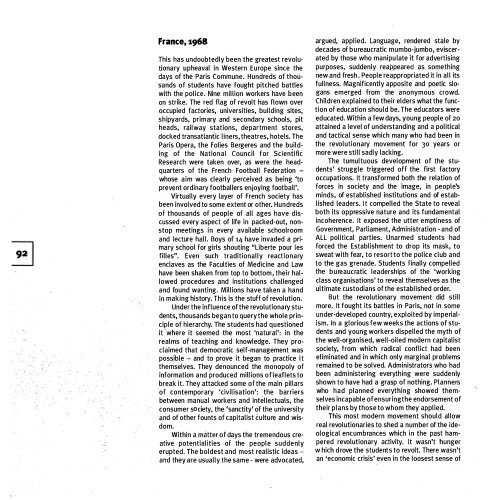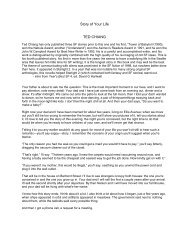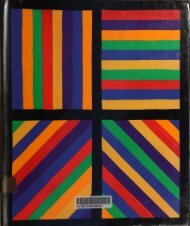SITUATIONISTS AND THE 1£CH MAY 1968
umMYFs
umMYFs
Create successful ePaper yourself
Turn your PDF publications into a flip-book with our unique Google optimized e-Paper software.
France, <strong>1968</strong><br />
This has undoubtedly been the greatest revolutionary<br />
upheaval in Western Europe since the<br />
days of the Paris Commune. Hundreds of thousands<br />
of students have fought pitched battles<br />
with the police. Nine million workers have been<br />
on strike. The red flag of revolt has flown over<br />
occupied factories, universities, building sites,<br />
shipyards, primary and secondary schools, pit<br />
heads, railway stations, department stores,<br />
docked transatlantic liners, theatres, hotels. The<br />
Paris Opera, the Folies Bergeres and the building<br />
of the National Council for Scientific<br />
Research were taken over, as were the headquarters<br />
of the French Football Federation -<br />
whose aim was clearly perceived as being 'to<br />
prevent ordinary footballers enjoying football'.<br />
Virtually every layer of French society has<br />
been involved to some extent or other. Hundreds<br />
of thousands of people of all ages have discussed<br />
every aspect of life in packed-out, nonstop<br />
meetings in every available schoolroom<br />
and lecture hall. Boys of 14 have invaded a primary<br />
school for girls shouting "Liberte pour \es<br />
filles". Even such traditionally reactionary<br />
enclaves as the Faculties of Medicine and Law<br />
have been shaken from top to bottom, their hallowed<br />
procedures and institutions challenged<br />
and found wanting. Millions have taken a hand<br />
in making history. This is the stuff of revolution.<br />
Under the influence of the revolutionary students,<br />
thousands began to query the whole principle<br />
of hierarchy. The students had questioned<br />
it ·where it seemed the most 'natural': in the<br />
realms of teaching and knowledge. They proclaimed<br />
that democratic self-management was<br />
possible and to · prove it began to practice it<br />
themselves. They denounced the monopoly of<br />
information and produced millions of leaflets to<br />
break it. They attacked some of the main pillars<br />
of contemporary 'civilisation': the barriers<br />
between manual workers and intellectuals, the<br />
consumer society, the 'sanctity' of the university<br />
and of other founts of capitalist culture and wisdom.<br />
Within a matter of days the tremendous creative<br />
potentialities of the people suddenly<br />
erupted. The boldest and most realistic ideas<br />
ahd they are usually the same · were advocated,<br />
argued, applied. Language, rendered stale by<br />
decades of bureaucratic mumbo-jumbo, eviscerated<br />
by those who manipulate it for advertising<br />
purposes, suddenly reappeared as something<br />
new and fresh. People reappropriated it in all its<br />
fullness. Magnificently apposite and poetic slogans<br />
emerged from the anonymous crowd.<br />
Children explained to their elders what the function<br />
of education should be. The ed ucators were<br />
educated. Within a few days, young people of 20<br />
attained a level of understanding and a political<br />
and tactical sense which many who had been in<br />
the revolutionary movement for 30 years or<br />
more were still sadly lacking.<br />
The tumultuous development of the students'<br />
struggle triggered off the first factory<br />
occupations. lt transformed both the relation of<br />
forces in society and the image, in people's<br />
minds, of established institutions and of estab·<br />
lished leaders. it compelled the State to reveal<br />
both its oppressive nature and its fundamental<br />
incoherence. lt exposed the utter emptiness of<br />
Government, Parliament, Administration • and of<br />
ALL political parties. Unarmed students had<br />
forced the Establishment to drop its mask, to<br />
sweat with fear, to resort to the police club and<br />
to the gas grenade. Students finally compelled<br />
the bureaucratic leaderships of the 'working<br />
class organisations' to reveal themselves as the<br />
ultimate custodians of the established order.<br />
But the revolutionary movement did still<br />
more. lt fought its battles in Paris, not in some<br />
under-developed country, exploited by imperialism.<br />
In a glorious few weeks the actions of students<br />
and young workers dispelled the myth of<br />
the well-organised, well-oiled modern capitalist<br />
society, from which radical conflict had been<br />
eliminated and in which only marginal problems<br />
remained to be solved. Administrators who had<br />
been administering everything were suddenly<br />
shown to have had a grasp of nothing. Planners<br />
who had planned everything showed themselves<br />
incapable of ensuring the endorsement of<br />
their plans by those to whom they applied.<br />
This most modern movement should allow<br />
real revolutionaries to shed a number of the ide·<br />
ological encumbrances which in the past ham·<br />
pered revolutionary activity. it wasn't hunger<br />
which drove the students to revolt. There wasn't<br />
an 'economic crisis' even in the loosest sense of










